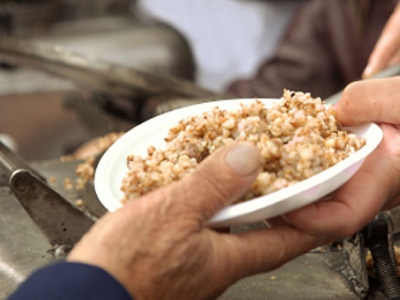
What is Lent and how might we observe it?
Ideas for individuals and families.
Lent traditions
Lent is the season of the Church calendar which comprises the 40 days (plus Sundays) before Easter. It has been observed since the earliest days of the Church and is modelled on Jesus’ 40 days of testing in the wilderness. Traditionally, Lent is a season of self-examination, prayer, fasting and giving, which is designed to prepare a person’s heart for the celebration of Easter.
Lent begins on Ash Wednesday when many Anglican churches hold a special service of repentance, culminating in the minister marking each person’s head with ash in the sign of a cross, saying:
‘Remember that you are dust, and to dust you shall return. Turn away from sin and be faithful to Christ.’
During Lent, Christians have traditionally fasted from meat, fish, eggs and butter, and restricted themselves to only one full meal each evening (a small amount of food would also be eaten in the morning and at midday). This did not count for Sundays, which were still considered days of celebration. Children, the elderly and pregnant and breastfeeding mothers were not expected to fast. In general, these ‘rules’ for fasting have become more relaxed. Today, even the Roman Catholic Church requires adults to fast only on Ash Wednesday and Good Friday and abstain from meat on the Fridays of Lent.
In order to rid the kitchen of ‘forbidden’ foods before Lent, Christians began celebrating Shrove Tuesday (also known as Mardi Gras or ‘Fat Tuesday’) the day before, when they would eat up all their ‘luxury’ foods. At some times in history, Christians gave up eggs, sugar and dairy for Lent, which gave rise to the tradition of cooking of pancakes on that day.
In addition to this ‘giving up’, Lent is a time for taking up the spiritual disciplines of prayer and giving in a more focused way. Physical hunger is meant to drive the worshipper to depend on God more prayerfully; the money saved by refraining from ‘luxury’ foods (such as meat) can be shared generously with those in need.
Lent, modernised
Some modern Christians choose to ‘fast’ from different things during Lent. Some common things to give up are chocolate/sugar, alcohol or social media. The idea is that when you are tempted to go to these things for comfort, you seek God in prayer instead. Giving up social media can also free up more time and attention that we can devote to God.
Youthworks Media publishes a new Lent devotion every year to help individuals and small groups focus on Jesus in the lead-up to Easter. This year, Reg Piper takes us through Paul’s expansive and heartfelt letter to the Romans.
When it comes to giving, some churches take up an extra offering during Lent for a particular project. Individual Christians might choose a ministry or charity to support with an extra donation during Lent.
Lent for families
Children were not included in the traditional form of Lenten fasting, but giving up chocolate, red meat or some screen time (except on Sundays) is something that the whole family could try. We could forgo buying takeaway food and drinks and collect up the money we’ve saved for charity. But it’s important to remember that the main purpose of fasting is to help us depend on and spend time with God.
Whether we ‘fast’ or not, we could choose to prioritise prayer and Bible reading as a family. Ed Drew from ‘Faith in Kids’ has written a set of Lent devotions for families called The Wonder of Easter. Growing Faith contributors Arthur and Tamie Davis have also shared a 'Lenten cross' reading plan that their family uses.
We could also decide to learn about and give some money towards a particular cause. In our family, we read a book of mini-biographies of historical Christian figures (Everyone a Child Should Know) during Lent, to remind us of the hardships that many Christians have had to endure for their faith. We could follow this up by supporting actual persecuted Christians through ‘Open Doors’ or ‘Barnabas Fund’.
Families could prioritise giving in other ways, by offering practical to help others, both inside and outside the family (here’s a list of ideas: https://littleshootsdeeproots.com/kids-ideas-blog/40-lent-ideas-kids/).
This year, Lent starts on Wednesday, February 22. What plans could you make to prepare your family’s hearts for Easter?
Further reading
https://www.eternitynews.com.au/in-depth/its-lent-so-what-does-that-mean-exactly/
https://sydneyanglicans.net/news/commune-with-christ/47239#:~:text=Lent%20is%20often%20seen%20as,the%2040%20days%20of%20Lent
https://www.australianchurchrecord.net/in-defence-of-lent/
https://www.churchofengland.org/prayer-and-worship/worship-texts-and-resources/common-worship/churchs-year/times-and-seasons/lent#mmm117
https://littleshootsdeeproots.com/kids-ideas-blog/40-lent-ideas-kids/

The God Who Is For Us
Paul, the ‘apostle to the Gentiles’, wrote to the Roman church with 25 years of ministry under his belt. His passionate proclamation of righteousness only through Christ and the foundational truths that flow from this are brilliantly argued in this letter, and it remains key reading for healthy churches and thriving Christians today. Experienced preacher and pastor Reg Piper shares his infectious love for Romans and his insights into Paul’s message in these engaging daily reflections.
For more articles from Growing Faith, subscribe to our monthly e-newsletter.
To hear about the latest books and resources from Youthworks Media, subscribe here.








